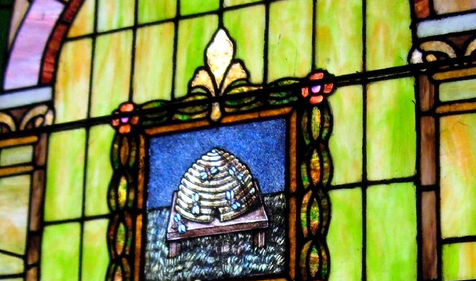Recently The Northern Light talked with Bro. Yasser Al-Khatib, one of the founders of the Hauts Grades Academy, to learn about his Masonic background, what inspired him to start the HGA, and how the program works. The Hauts Grades Academy is an educational initiative created in partnership with the NMJ, aiming to enhance member experiences and offer SRNMJ Masons the chance to further the journey of their craft.
TNL: Before we begin, tell me about your Masonic background. When and where did you join the fraternity?
Yasser: Back in November 2006, I joined Fritz Lodge No. 308, in Conshohocken, PA. I was Worshipful Master in 2010.
TNL: How about Scottish Rite?
Yasser: I became a member in the Valley of Philadelphia in 2012. Four years later I was awarded the Meritorious Service Award, and I was nominated to receive the 33˚, in 2019, in Milwaukee. Currently I am Sovereign Prince for the DeJoinville Council, Princes of Jerusalem.
TNL: You are one of the prime movers of the new Hauts Grades Academy. Where did the idea for such a program originate?
Yasser: It was a joint effort. Many years ago, I became interested in learning more about Freemasonry. I attended several seminars. I signed up for the Academy of Masonic Knowledge in 2007: It’s a three-tiered program. I continued on, joining the Lodge of Research of Pennsylvania. Later, I started to teach. There’s an old saying: “To learn it, teach it.”
TNL: How did you go about making it happen?
Yasser: I felt that more Masonic education was needed so I contacted Mohamad A. Yatim, 32˚, E. Oscar Alleyne, 32˚, and Conor P. Moran, 32˚, acquaintances who felt a similar need for more Masonic knowledge. Between us we developed an outline for the program. In the spring of 2017, we presented the idea to the Sovereign Grand Commander. With an initial go-ahead, we brainstormed and put the building blocks together. We made a presentation to the SGC and Leadership Committee in August. With their buy-in and support, we launched in January of this year.
TNL: Who else is involved?
Yasser: In addition to the four of us, our board includes James O. Dill, 33˚, William Holland, 33˚, and Linda Patch, from Supreme Council headquarters, and Christopher Hodapp, 33˚, a noted Masonic author and former editor of the Journal of the Masonic Society.
TNL: How does one enroll in the program?
Yasser: First, you express interest. Go to the NMJ’s website member section and complete an intent of interest – in other words, an application form. When accepted the applicant receives an email with a user name and password. You will watch a video, then sign a form stating that you will not reveal anything that should not be shared with the outside world. This, of course, is on the honor system.
TNL: Tell us a little about the program. What are the steps? How does it work?
Yasser: There are three levels. In the first you will learn some history, and there will be randomized questions on all degrees. There are 29 quizzes in total on each of the degrees, which require the participant to read the degrees and then answer the questions. Once completed, a person moves on to level two. Here you will write a series of self-reflective essays. One must choose a degree to research and write about. Subjects include the core value exemplified in the degree, how well it was communicated, if at all. It ends with a two- to three-page essay. It serves multiple purposes. Not only does the person learn the degree but it gives him writing practice. Many of the program members may not have been required to write since their school days.
Then it’s on to level three.
Here, the candidate is required to conduct a research project, resulting in a paper of about 2,500 to 3,000 words. Certain criteria must be met. The paper needs to cover history, philosophy, and ritual. A side goal of this section is to generate a number of academic papers. They may appear in The Northern Light. Potentially we choose a best paper of the year, much in the fashion of the Prestonian Lecture. The early plans call for a paper to be delivered every two years at the Supreme Council Annual Meetings or at some other event, perhaps involving the Scottish RIte Masonic Museum & Library.
TNL: What type of Mason do you envision enrolling?
Yasser: They are coming from all walks of life, places, and ages.
TNL: Any early feedback yet?
Yasser: We have received many thank you notes. People seem to be enjoying it. There also has been constructive criticism, and we’ve implemented much of the advice. For instance, at the request of several participants we have created an entire section containing resource materials, instructions, a list of core values by degree, and a quick lesson on how to reference and cite sources.
TNL: What’s in store for the future? Are you planning any changes?
Yasser: It’s a little early to make any changes, but we do feel that we need a “deep dive” every three years. We’ll take a look at what’s worked, what hasn’t, and what needs tweaking. We want the program to continuously evolve. Eventually, we want some of the early participants to join the board, to provide an insider’s look.
TNL: When you’re not working on the HGA program, what do you do?
Yasser: Think about HGA. Actually, I am a registered nurse.
TNL: Do you have any final comments?
Yasser: We are very much interested in feedback. This will never be a final product. Don’t judge it as being final. It needs to be an ever-progressing, ever evolving, ever-changing program.
TNL: Thank you, Yasser, for taking the time to explain this exciting new program, and congratulations to you, Mohamad, Oscar, and Connor, as well as to those at Supreme Council headquarters who helped bring this about.
Related Stories
Discover additional Scottish Rite blogs and news on this topic.
-
What Does the Beehive Mean in Freemasonry?
Degrees
Read More about What Does the Beehive Mean in Freemasonry?
-
Was Robert Burns a Freemason?
Famous Masons
Read More about Was Robert Burns a Freemason?
-
Celebrate Summer with Masonic Marketplace Must-Haves
News
Read More about Celebrate Summer with Masonic Marketplace Must-Haves



